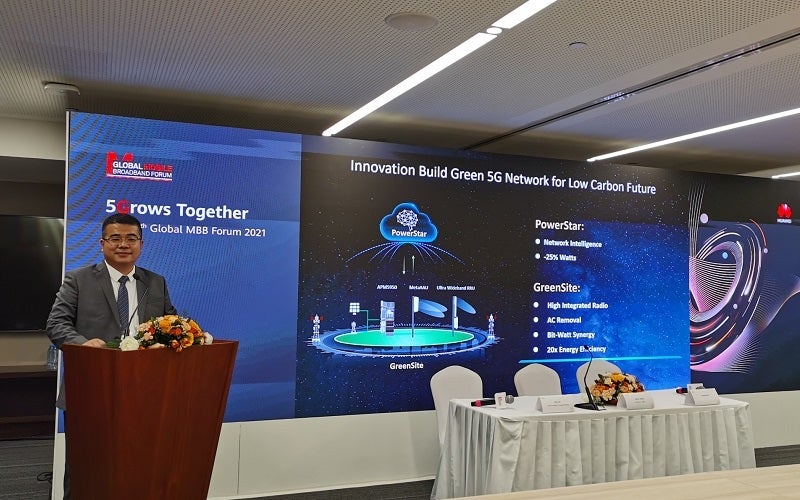
Fast-growing reliance on wireless networks means that the carbon footprint of mobile connectivity is set to increase, according to industry leaders and climate campaigners. Whether 5G will reduce or exacerbate the problem remains a point of contention.
At the annual Global Mobile Broadband Forum (MBBF) in Dubai last week, global network providers presented their vision for the future of 5G, and there was one overarching consensus: sustainability will become essential in the mobile network sector.

Access deeper industry intelligence
Experience unmatched clarity with a single platform that combines unique data, AI, and human expertise.
At the event, Huawei’s executive director and president of the carrier business group, Ryan Ding, gave a speech saying that “the whole industry will need to keep pursuing innovations in power supply, distribution, use, and management, and build greener 5G networks with higher performance and lower energy consumption.”
The ICT industry currently accounts for approximately 3% to 4% of global CO2 emissions, according to Boston Consulting Group (BCG). Estimates show that it accounts for 5% to 9% of global electricity consumption, a number that experts predict will increase with the widespread adoption of 5G technology.
The next-generation network technology is said to increase data transmission speed, making it more responsive and allowing for greater and simultaneous connectivity among a large number of devices. It promises almost instantaneous transfer and downloads of data, a development that will be essential in the uptake of self-driving cars, smart cities, the expansion of the Internet of Things (IoT) and the general advancement of everyday technology.
Great speed, greater responsibility
With great speed comes great responsibility. Faster transfer means that more data can be processed, thus requiring more storage. Studies have claimed that the additional data centres needed to support the 5G revolution will increase energy consumption and carbon emissions.

US Tariffs are shifting - will you react or anticipate?
Don’t let policy changes catch you off guard. Stay proactive with real-time data and expert analysis.
By GlobalDataDing also admitted in his speech that with the widespread uptake of 5G, the average data traffic per user per month would reach 600 GB by 2030. If the energy efficiency of existing networks remains unchanged, the energy consumption of wireless networks will increase by more than tenfold.
Reports released by individual climate councils and activist groups paint a bleak picture of the new technology.
A study conducted last year by the Haut Conseil pour le Climat (HCC), an individual body tasked with advising the French government on climate policies, found that 5G technology could cause a significant increase in carbon emissions.
The additional emissions will come mainly from manufacturing new devices, such as smartphones and headsets, and from network and data centre equipment. The study also found that the deployment of 5G would lead to an increase in electricity production in France.
In China, a widescale adaptation of 5G could have an even more detrimental impact. According to a report from Greenpeace, China’s digital sector is on track to almost triple its energy consumption by 2035. Electricity demand from China’s network infrastructure is expected to rise 289% by 2050, putting pressure on the country’s pledge to reach carbon neutrality by 2060.
5G is singled out as one of the main drivers of the increase. Annual power consumption from the next-generation wireless technology is predicted to increase 488% by 2035.
According to GlobalData’s thematic scorecard on sustainability among telecom infrastructure providers, Huawei scored particularly low. It received a mark of 2 out of 5. The report predicts that its low score in sustainability will have a negative impact on the company’s earnings in the next 12 months.
When asked by Verdict how Huawei plans to mitigate the power usage of data centres, the president of Huawei’s SRAN product line, Aaron Jiang, replied:
“Huawei also has computing and storage product lines, and we are also making huge efforts on being green and being power efficient. As far as I understand, the data centre PUE (power usage effectiveness) in China has been reduced to below 1.2. New intelligent technologies are also being used in data centres, for example, liquid cooling.”
Will 5G be the green saviour?
Huawei is adamant that 5G technology will lead to greater efficiency and thus reduce energy consumption.
Ding said that to cut the ICT industry’s greenhouse gas emission by 45%, operators will need to pursue greener 5G networks, adding that 5G technology can aid in the fight to reach carbon neutrality. Other network operators, such as Ericsson and chipmaker Qualcomm have previously also claimed that 5G would be an ally in combating climate change.
The main argument underpinning 5G as an enabler for a greener future is that greater and faster connectivity can improve, for instance, traffic fluidity and reduce energy consumption in cities or production lines. The argument is also made that 5G can help distribute decentralised renewable energy sources such as solar and wind.
5G linked with IoT is also said to increase energy efficiency, as devices will be able to power up and shut down automatically when not needed. Sensors in appliances, transportation networks, buildings, factories, street lights, residences and more will monitor and analyse their energy needs and consumption in real-time and should be able to automatically optimise energy use.
Huawei and other telecom equipment providers are optimistic about the opportunities that 5G will bring for sustainability.
“The growing demand for both toB and toC services leads to an explosive increase in data traffic. This highlights the importance of improving energy efficiency in building green low-carbon networks,” concludes Jiang. “Huawei will continue to develop innovative solutions and bring intelligence to base stations to help operators build green, low-carbon 5G networks and achieve the carbon peak and neutrality goals.”







